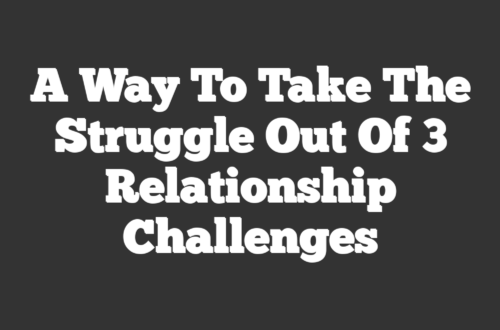
It’s not the nicest feeling, is it? That sense that your partner’s friends just aren’t that into you. It’s as if there’s an invisible wall between you and them that you just can’t seem to break through.
So, I’ve put together some simple ideas and small steps that can help you bridge the gap—or at least cope with it better. Because it’s not just you—it’s a pretty common bump on the relationship road.
Hang with me a little longer, and we’ll get into the how and why!
Communicate Openly With Your Partner
Let’s get real about something. If you’re feeling weird because your partner’s friends don’t seem to like you, you’ve got to talk to your partner.
Pick a good time when you can sit down together and just be honest. Say how you’re feeling in a calm way. It’s like telling a friend, “Hey, I’m feeling a bit left out, and I’m not sure what to do about it.”
After you bring it up, listen to what your partner says. They might tell you things you didn’t know about their friends that might help you see the whole picture. Remember, the goal is not to make your partner take your side—you just want them to know what’s going on.
Reflect on Your Feelings
Think for a moment about what’s really bugging you. It can be hard to shake off the feeling that your partner’s friends don’t like you. But where is that feeling coming from?
It might help to sit down somewhere quiet and think about it. Is it about them, or is it touching a nerve from your own past? Get clear on this.
Here’s what to think about:
- Have a little chat with yourself about the true reasons you feel uncomfortable.
- Think about whether you’ve given them a fair chance or if you’ve decided too quickly that they don’t like you.
- Honestly figure out if it’s them or if it’s your own worries talking.
Attempt to Understand Their Perspective
Think about why your partner’s friends might act the way they do. Maybe they’re just looking out for your partner or they’re used to joking around in ways that seem strange to you.
- Consider how they interact with each other— is it different from how you’re used to?
- Could they have had a bad experience in the past that makes them careful now?
- Are there things you might not get about their way of doing things?
When you try to understand where they’re coming from, it can help you not take their behavior personally.
Remember: You’re trying to learn about them, just as you hope they’ll want to learn about you. This can help make your meetings easier and more friendly.
Acknowledge Your Differences
Just like everyone has their favorite food or color, we all have our ways of doing things. Your partner’s friends have their habits and ways, and you have yours. Sometimes, these differences can make us feel like we don’t fit in.
- Accept that everyone has their own likes and dislikes.
- Know that different opinions can coexist peacefully.
- Respect their views even if you don’t agree with them.
You can still be yourself and let them be who they are. When you accept that it’s fine to be different, it takes the pressure off everyone to agree all the time.
Show Genuine Interest in Them
People usually like it when someone is interested in what they say or do. So, when you’re with your partner’s friends, try to show that you’re interested in getting to know them.
- Ask them questions about their interests.
- Listen when they talk, and not just wait for your turn to speak.
- Share things about yourself that they might find interesting.
Don’t worry, it’s not about becoming best buddies right away, but about getting to know them little by little. When they see you’re making an effort, they might start doing the same.
Reflect On Your Behavior
Sometimes, without meaning to, we can act in ways that might put others off. It can be helpful to think about how your actions might look to someone else.
For example, if you’re quiet, they might think you’re not interested, or if you talk a lot, they might think you’re not listening.
Taking time to think about your actions can show you if there’s anything you want to improve. It’s not about changing who you are but about being the best “you” when you’re with others. And sometimes, this little bit of change can make a big difference in how people see you.
Be Yourself
In the midst of trying to get on your partner’s friends’ good side, don’t forget the person who matters most here—you. It can be tempting to change to fit in, but that’s like wearing a shoe that doesn’t fit. It might look nice, but it sure doesn’t feel nice after a while.
You want these friends to like you for you, not for someone you’re pretending to be. Sometimes, just relaxing and being yourself can make all the difference. It can help you feel more comfortable, and it lets others see the wonderful person your partner loves.
Show Kindness and Respect
No matter the situation, being kind and treating people with respect is always a good choice.
Ways to show kindness and respect:
- Listen to them without interrupting.
- Speak well of them and their relationship with your partner.
- Show appreciation for the role they play in your partner’s life.
Sometimes, you might not get kindness in return right away, and that’s okay. Keep being kind and respectful because it’s the right thing to do. Over time, people often warm up, and they might start to see you in a whole new way.
Keep an Open Mind
It’s always good to remind ourselves to be open to new ideas and people. Try to listen and understand where they’re coming from. They might have different opinions or ways of doing things, but that’s what makes everyone unique.
- Be ready to hear new ideas or ways to have fun without judging right away.
- Think of this as a chance to learn something new about others and maybe even yourself.
- Every time you meet them, approach it as a new opportunity without past worries weighing you down.
Staying open means you avoid jumping to conclusions based on one or two bad experiences. You let each encounter be a fresh start. And who knows? You might end up finding out that you’ve got more in common with these folks than you first thought.
Respect Their Relationship with Your Partner
Your partner and their friends have a bond that’s been built over time. It’s a friendship that has its own history, full of inside jokes and shared memories. Acknowledge that their bond is special and important.
How to show respect:
- Understand that you’re not there to replace anyone or disrupt their friendship.
- Let them have their moments together.
- Show that you value their connection and that you’re not a threat to it.
By showing respect for their long-standing friendships, you’re showing respect for your partner, too. Your understanding and support can strengthen your bond with your partner, and their friends might see your good intentions more clearly.
Seek Common Interests
What are the things you all might enjoy? Maybe it’s a love for certain types of food, music, movies, or sports. Sharing activities based on mutual interests can create positive experiences and memories.
Finding something you all like gives you a reason to come together and have a good time. It makes room for fun and laughter, and those are the best ingredients for warming up any chilly relationship.
Invite Them To Group Activities
Sometimes, the best way to break the ice is by creating a fun group setting where everyone can relax.
Ideas for group activities:
- Host a game night everyone can enjoy.
- Plan an outdoor picnic or BBQ.
- Organize a group outing, like bowling or a movie night.
This is a chance for you to show you’re a great person to be around. In this kind of setting, it’s easier for your partner’s friends to see the cool person your partner chooses to be with.
Prioritize Your Relationship With Your Partner
Your relationship with your partner is what’s most important. Try to keep this in mind, especially when things feel tough with their friends. You and your partner are a team, and working together can make both of you stronger.
How to prioritize your relationship:
- Make time for just the two of you regularly.
- Communicate openly about your needs and listen to theirs.
- Show appreciation and affection towards each other.
Working on your bond keeps your relationship at the center. It’s your safe home base. Keeping this strong gives both of you the confidence and support to handle any challenges that come from outside.
Focus on Improving Your Relationship with Your Partner
When you work on building a happy and healthy relationship with your partner, believe it or not, it can sparkle up the way their friends see you. A good and solid connection with your partner sends a positive vibe that’s hard to ignore.
This can surely soften their friends’ views. They’ll notice the happiness and the team spirit that you and your partner have. When they see a relationship that’s full of trust and cheer, it’s hard not to start feeling good about it, too.
Be Supportive of Your Partner’s Social Life
Being in a relationship doesn’t mean that you and your partner have to do everything together. It’s healthy for both of you to have your time with friends.
This support tells your partner that you’re confident in your relationship. It also shows their friends that you respect their time together. Over time, they might see you as thoughtful and considerate, which is always a plus.
Stay Positive and Optimistic
Nobody enjoys being around a gloomy person all the time. That’s why staying positive can make a huge difference. When you’re with your partner’s friends, share the good stuff. A positive vibe can make others feel good, too.
- Talk about happy news or fun plans you’re looking forward to.
- Encourage your partner’s friends when they mention their own plans or successes.
- Smile—it’s a simple thing, but it can really turn things around.
It’s not about pretending everything’s perfect; it’s about focusing on the good whenever you can. With time, this can help your partner’s friends connect with you on a happier note.
Give It Time
If you’re waiting for your partner’s friends to warm up to you, remember it often takes time. Friendships don’t always happen overnight, and that’s okay.
- Keep showing up, keep being kind, and give it more time.
- Don’t get discouraged if you don’t see changes immediately.
- Think of every positive encounter as a step in the right direction.
Being patient is about waiting for the good times to come while putting in the effort to be pleasant and friendly. It’s also about not forcing things to happen.
Offer Help or Support When Needed
If you see an opportunity where you can offer support or assistance, go for it. It could be something simple like helping them move to a new place or offering advice on a problem they’re dealing with.
Your willingness to help can show them you’re a caring person. It can break down barriers and build up trust. People remember who was there for them when they needed something.
Avoid Speaking Negatively About Them
It’s tempting to vent when we’re frustrated, but speaking badly about your partner’s friends can backfire. It might feel good in the moment, but it can create more problems later.
Instead, try to focus on the positive things about them, or if you need to get something off your chest, choose a neutral party who isn’t involved.
Speaking positively or neutrally about your partner’s friends not only keeps the peace but also reflects well on you. It shows maturity and a willingness to make the best of a tricky situation.
Avoid Competing for Your Partner’s Attention
Your partner’s time is precious to you, that’s for sure, but their friends are important too. Trying to pull your partner away from their friends or getting upset when they spend time with them isn’t the way to go.
When you don’t make your partner pick between you and their friends, you’re sending a message that you’re thoughtful and that you respect their needs. This can help create a more relaxed and trusting atmosphere in your relationship, and over time, their friends will notice and respect you for it.
Apologize if You’ve Made Mistakes
We all make mistakes sometimes. If you look back and realize that you might have done something to upset your partner’s friends, it’s important to say sorry. A sincere apology can go a long way in making things right.
Apologizing can show that you’re willing to be responsible for your actions. It can ease tension and open the door to a new beginning. The friends might start to see that you’re someone who can admit when you’re wrong, and that’s a great quality to have.
Avoid Forcing a Relationship
Let things happen naturally rather than trying to push it. If you try too hard to make your partner’s friends like you, it can actually have the opposite effect, making things uncomfortable for everyone.
It’s better to be patient and allow a friendship to grow over time. If it’s meant to be, it will happen. And if not, it’s okay to have a polite and friendly relationship without being close friends.
Maintain Your Independence
While it’s great to be part of a couple, don’t forget you’re also an individual with your own life and interests. Keeping up with your own hobbies and friendships outside your relationship is really important.
When you have a life outside your partnership, it makes you more interesting and helps you stay balanced. Your partner’s friends will see that you have your own things going on, and that’s attractive. It shows that you’re a whole, confident person on your own.
Keep Personal Disputes Private
If you and your partner have a disagreement, it’s best to keep that between the two of you. Sharing private disputes with friends can lead to awkwardness and might even alter their perception of you or your relationship.
- Solve your issues with your partner directly; don’t involve their friends.
- Private matters must stay private so they don’t become bigger than they are.
Talking things privately also prevents friends from forming opinions based on just one side of the story. By keeping personal matters personal, you keep your relationship strong and your interactions with friends comfortable.
Avoid Oversharing Personal Information
Getting to know your partner’s friends is important, but that doesn’t mean you need to share every little detail about your life right away. Personal stories and sensitive information should be shared with care, and only when trust has been established over time.
- Consider if the information is something you’re comfortable with everyone knowing.
- Share small details about your life to start; you can always share more as you all become closer.
- Remember, once shared, you can’t take back the information.
This also ensures that your personal stories don’t become the topic of conversation when you’re not around. As the trust grows, you’ll naturally feel more comfortable sharing more about yourself.
Set Boundaries If Necessary
Sometimes in relationships, we need to set limits on what is okay and what isn’t. If certain behaviors from your partner’s friends make you uncomfortable, it’s alright to express that to your partner in a clear and calm manner.
Setting boundaries aims to keep the good in and the bad out. It helps you feel safe and respected in social situations, and it lets your partner know what they can do to support you.
Be Open to Making the First Move
Waiting for your partner’s friends to come around may take a while. Don’t be afraid to reach out first. A friendly greeting or a thoughtful gesture can break the ice and show that you’re someone who’s open and approachable.
- Send a message to say hi or leave a nice comment on their social media post.
- Offer a handshake, or if it’s culturally appropriate, a warm smile when you see them.
- Organize an event and invite them to show you’re interested in getting to know them better.
Taking the initiative shows that you’re willing to put in the work to make things better. It demonstrates maturity and confidence, which can be very appealing.
Avoid Making Your Partner Choose Sides
Your partner likely values both their relationship with you and their friendships. Putting them in a spot where they feel like they must choose one over the other isn’t fair and can create anxiety and tension.
Showing that you respect their friendships, even if those friends aren’t your biggest fans, can take a lot of pressure off your partner. It lets both you and your partner enjoy your relationship without added stress.
Be Open to Compromise
In relationships and friendships, sometimes you have to meet in the middle. When it comes to your partner’s friends, this might mean going along to activities you’re not super excited about or giving them space to do their own thing without you.
Being flexible and willing to give a little can help everyone get along better. It demonstrates that you value your partner’s relationship with their friends and that you’re a team player.
Let Go of the Need for Approval
We all like to be liked. That’s normal. But when you’re always looking for a thumbs-up from your partner’s friends, it can get tiring and stressful. It’s important to remember that your self-worth isn’t tied to what others think of you.
When you stop worrying about approval, you get to be more relaxed and authentic, which is often when people start to appreciate you for who you really are. Be at ease and let friendships develop naturally.
Keep Your Cool in Uncomfortable Situations
There will be moments when you might feel like you’re sitting on a hot seat with your partner’s friends. Whether they’re sharing an inside joke you don’t get or discussing a topic you’re not familiar with, it’s important to keep calm.
- Breathe deep and remind yourself it’s just a moment in time.
- Smile, and if you can, ask questions to get more involved in the conversation.
- Acknowledge to yourself that it’s okay to feel out of place sometimes.
Keeping your cool shows that you can handle different situations with grace. Remember, the way you respond can turn an awkward moment into a chance to shine.
Remember That You Don’t Have to Be Best Friends
It’s great when you can be close buddies with your partner’s friends, but that’s not always how it works out, and that’s perfectly okay. You might click with some people and not so much with others.
Accepting this can take the pressure off everyone and allow for more relaxed interactions. Just because you don’t become best friends doesn’t mean you can’t enjoy the time you all spend together.
Maintain Your Sense of Humor
Keeping a sense of humor when you’re around your partner’s friends can ease tension and make the time spent together more enjoyable. It’s about finding the fun in small things and not taking every moment too seriously.
- Share funny stories or light-hearted jokes when it feels right.
- Laugh off minor awkward moments instead of making them a big deal.
- Enjoy the funnier side of life, it can be infectious.
Humor often helps break down barriers, and it shows that you’re a person who’s easy to be around. Plus, it can help your partner’s friends see a sparkling side of you that they might gravitate towards.
Show Appreciation for Their Time
Let them know you’re thankful that they’re sharing a part of their day with you. Gratitude goes a long way and can leave a lasting positive impression.
- A simple “Thanks for coming” or “I had a good time” can mean a lot.
- Be attentive when they speak; giving someone your full attention is a form of appreciation.
- If they go out of their way to include you, acknowledge it.
Frequently Asked Questions
How can I tell if my partner’s friends don’t like me?
Signs may include them excluding you from activities, minimal interaction or engagement with you, or negative body language when you’re around. However, interpretations can be subjective, so consider discussing your concerns with your partner for clarity.
What if I don’t like my partner’s friends at all?
Even if you don’t like your partner’s friends, it’s important to be respectful and civil. Your partner values these relationships, so try to focus on the positive aspects of the situation or find ways to cope with the interactions that are amicable.
What if there’s no improvement after trying everything?
Sometimes, despite your best efforts, relationships don’t improve. In such cases, focusing on maintaining a strong relationship with your partner is key. It may also be helpful to seek external advice or counseling to navigate complex dynamics.
Final Thoughts
Here’s the thing: being liked by everyone isn’t a must-do, it’s a nice-to-have. Your partner’s friends are just one part of your world. What’s more important is your happiness with your partner.
You’ve got this. Seriously.
Stand strong, be yourself, and let that be enough—life’s too short to worry about winning everyone over. After all, the best friendships aren’t rushed—they’re the ones that grow slowly.




